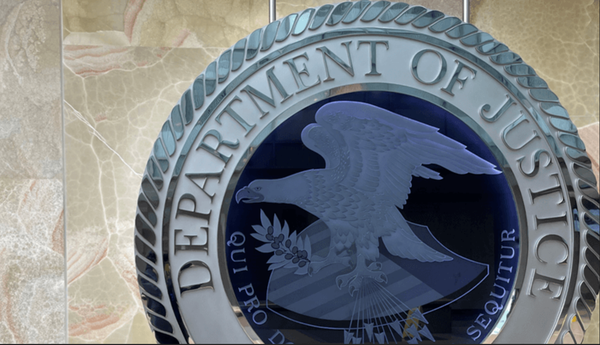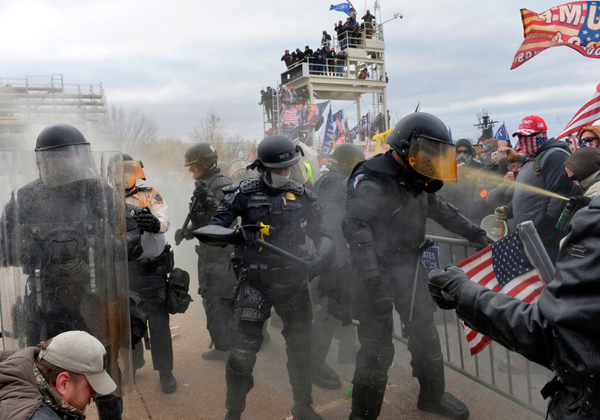Welcoming Their Hatred
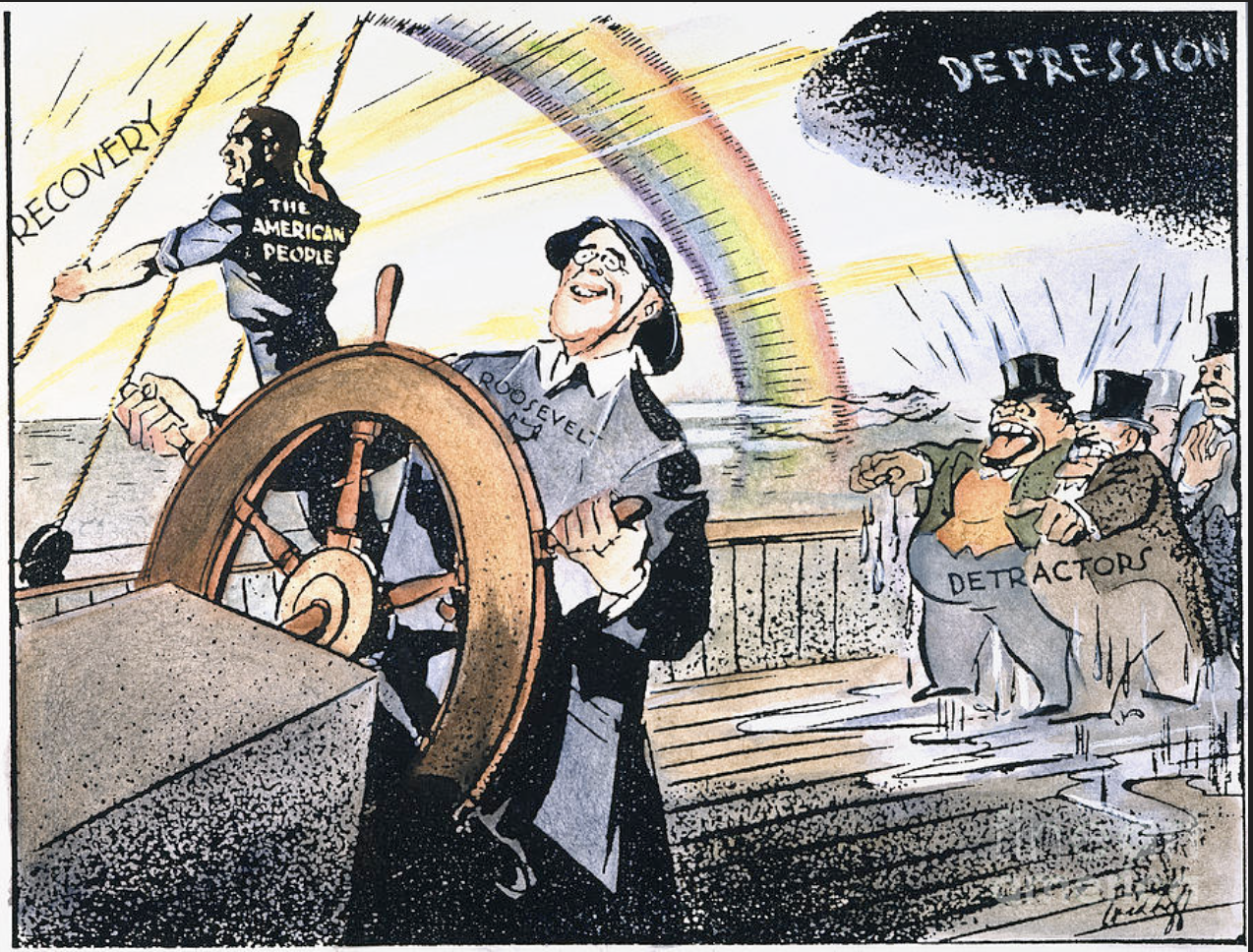
Yesterday, as the world's richest narcissist and the world's most powerful narcissist engaged in a campaign of mutually-assured destruction, social media platforms witnessed record new levels of schadenfreude.
Musk insisted that Trump was an ungrateful client who owed him his presidency and, by the way, a pedophile who was definitely in the Epstein Files; Trump mused about ending all his government contracts. Musk embraced calls for impeachment; Trump's allies upped the ante to deportation. And meanwhile, supplies of the "Let Them Fight" gif reached critical lows.
While most people outside the MAGA cult gleefully watched the chaos spread through conservative circles, a small number of Democratic voices had to chime in and remind us that they have the absolute worst instincts of any mammal outside the lemming family.
Naturally, Rep. Ro Khanna (D-Techbros) led the way:
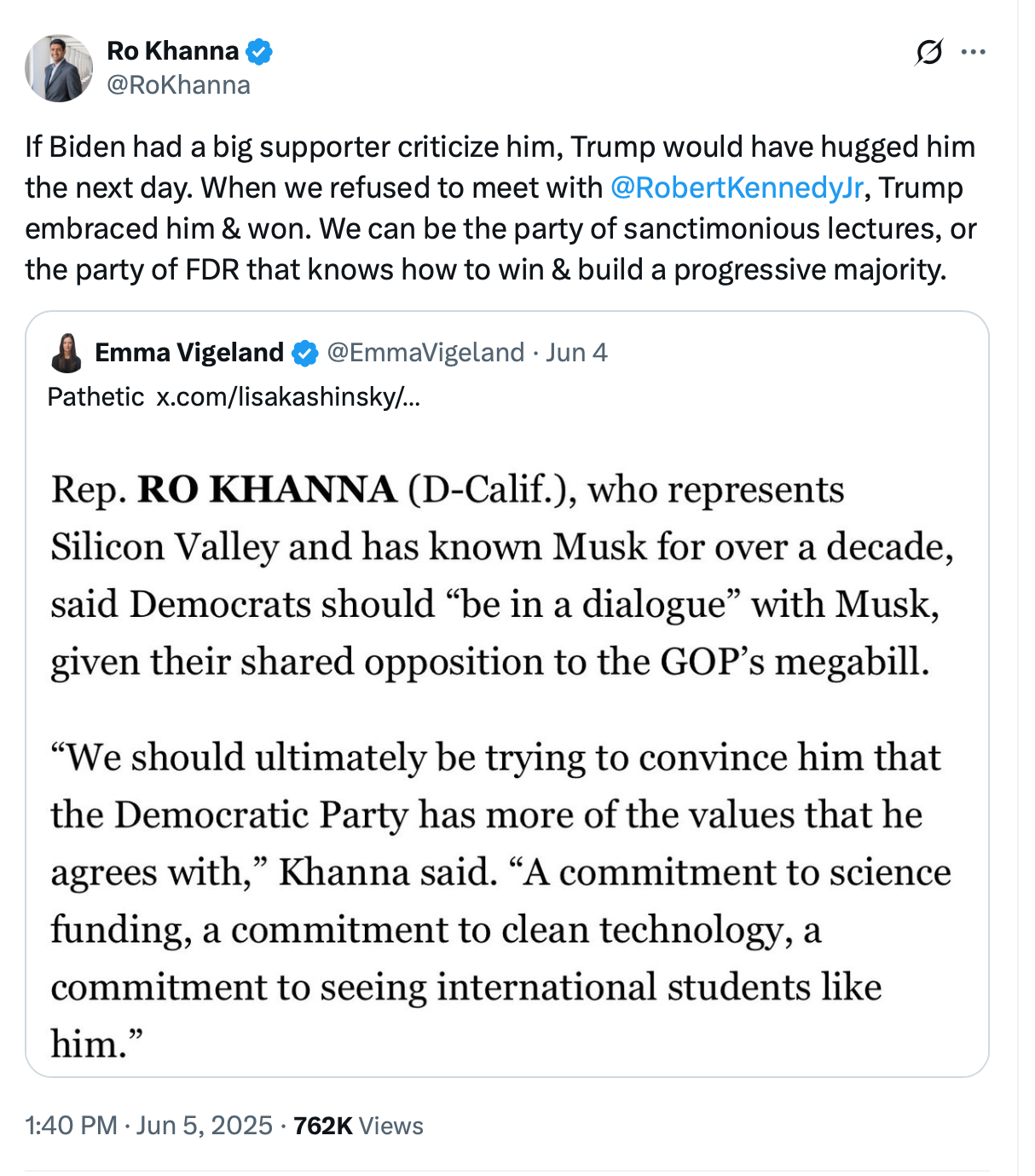
This is bad advice for the present but a horrible take on the past.
President Franklin Delano Roosevelt – perhaps more than any president in American history – understood the importance of drawing bright lines in political appeals.
FDR was not shy about expressing his political values and ideals in clear cut terms, often using "sanctimonious lectures" to make his case. And when he did so, Roosevelt understood that the clearest way for a politician to show that they will fight for those values, that they will fight for those ideals, that they will fight for people like you who share them, is to show who they're fighting against and how they're fighting them.
Despite his own patrician background and family wealth, FDR delighted in taking on the wealthy elite. He knew that most Americans blamed them in some way for the coming of the Great Depression and, moreover, that most Americans wouldn't trust any politician who took their side as the nation sought to extract itself from it.
"The money changers have fled from their high seats in the temple of our civilization," he stated in the "sanctimonious lecture" of his first inaugural address. "We may now restore that temple to the ancient truths. The measure of the restoration lies in the extent to which we apply social values more noble than mere monetary profit."
Needless to say, the "money changers" weren't happy with such attacks. While there were some notable exceptions, many in the upper-income brackets – who had thrived under the old system and worried that FDR's New Deal would put a dent in their personal prosperity and prestige – vilified the new president as a "traitor to his class." Many refused to even speak his name, referring instead to "that man" in the White House.
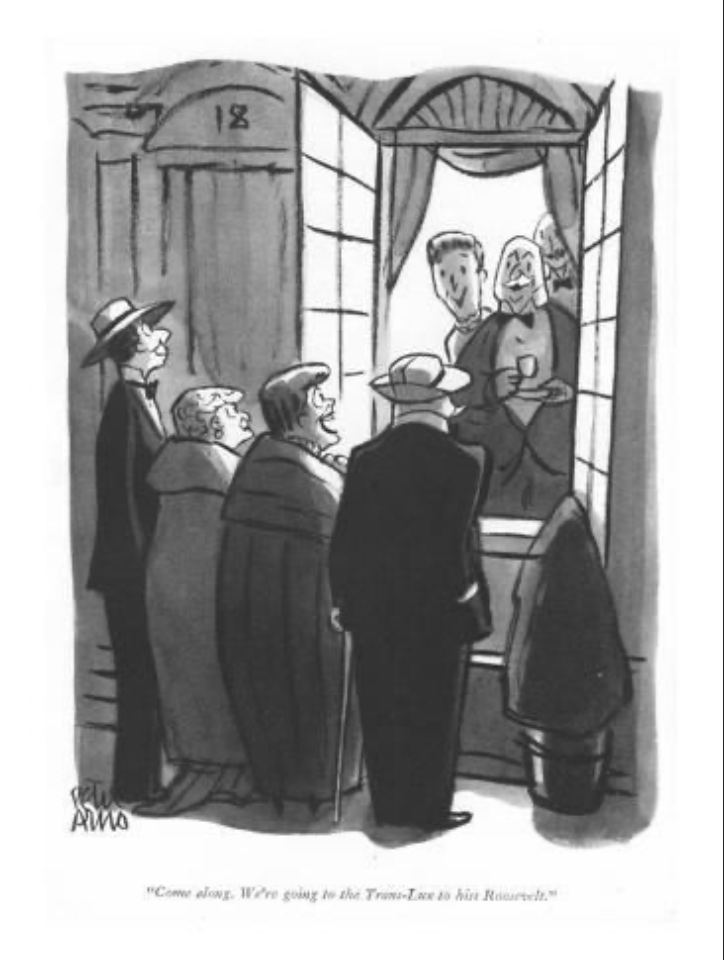
Rather than try to win these enemies over, FDR and his allies made the most of the friction. This Peter Arno cartoon from The New Yorker is not just a snapshot of the wealthy's frustrations with Roosevelt – reduced to going to a movie theater that showed newsreels and booing when FDR popped up in them – but also a reminder that for most Americans, the contempt of these elites was a sign that FDR was doing something right.
And FDR agreed. Throughout his presidency – and, especially, throughout his first term when his successes and his legacy were by no means guaranteed – Roosevelt regularly used the wealthy as a scapegoat and a foil.
A year into the New Deal, for instance, conservative critics of Roosevelt coalesced in a new organization called the American Liberty League. An all-star collection of politicians and business leaders, the Liberty League included some prominent names from the president's own party, including 1924 presidential nominee John W. Davis, 1928 presidential nominee Al Smith, and John J. Raskob, the former chairman of the Democratic National Committee. With bipartisan backing and the support of establishment figures, the Liberty League threatened to present a powerful counterargument to the New Deal.
But New Deal Democrats knew how to deal with it. Looking past the prominent politicians who were the face of the Liberty League, they seized on the involvement of wealthy businessman Irénée DuPont to dismiss the entire enterprise as the self-centered work of miffed millionaires. Postmaster General Jim Farley, a close confidant of the president, joked that the American Liberty League "ought to be called the American Cellophane League" because "first, it's a DuPont product and second, you can see right through it."
Throughout the early New Deal, FDR repeatedly turned to this line of criticism to discredit those who stood in his way.
In his fifth Fireside Chat in June 1934, for instance, FDR dismissed right-wing grumbling about the growing government program to end the Depression. "In the working out of a great national program which seeks the primary good of the greater number, it is true that the toes of some people are being stepped on and are going to be stepped on," he informed his listeners. "But these toes belong to the comparative few who seek to retain or to gain position or riches or both by some short cut which is harmful to the greater good."
Notably, the longer FDR went, the more he leaned into this approach. When the 1936 presidential campaign reached its closing days, the president delivered a scathing speech at Madison Square Garden in which he drew stark lines between the business elites who'd challenged him and the rest of the American people.
It's worth reading – or listening to – at length. Here's the key passage:
We have not come this far without a struggle and I assure you we cannot go further without a struggle.
For twelve years this Nation was afflicted with hear-nothing, see-nothing, do-nothing Government. The Nation looked to Government but the Government looked away. Nine mocking years with the golden calf and three long years of the scourge! Nine crazy years at the ticker and three long years in the breadlines! Nine mad years of mirage and three long years of despair! Powerful influences strive today to restore that kind of government with its doctrine that that Government is best which is most indifferent.
For nearly four years you have had an Administration which instead of twirling its thumbs has rolled up its sleeves. We will keep our sleeves rolled up.
We had to struggle with the old enemies of peace—business and financial monopoly, speculation, reckless banking, class antagonism, sectionalism, war profiteering.
They had begun to consider the Government of the United States as a mere appendage to their own affairs. We know now that Government by organized money is just as dangerous as Government by organized mob.
Never before in all our history have these forces been so united against one candidate as they stand today. They are unanimous in their hate for me—and I welcome their hatred.
I should like to have it said of my first Administration that in it the forces of selfishness and of lust for power met their match. I should like to have it said of my second Administration that in it these forces met their master.
He keeps going from there, skewering at length the business campaign to discredit the new Social Security Act with workers. Employers who spread "deceit" to their employees and tried to use their influence to undermine the New Deal were, he said, "aliens to the spirit of American democracy. Let them emigrate and try their lot under some foreign flag in which they have more confidence."
Three days later, FDR was re-elected in one of the most lopsided elections in American history. The class traitor president was rewarded with over 60% of the popular vote and racked up a jaw-dropping 523-8 margin in the Electoral College. Riding his considerable coattails, Democrats stretched their already wide margins to 334-88 in the House and 70-22 in the Senate.
So no, Rep. Khanna, making peace with the right-wing rich isn't a requirement for building a "progressive majority." Indeed, as FDR showed us, the opposite is true.
Democrats with an eye on the next election shouldn't be reaching out to make amends with Musk. They should instead welcome his hatred and return it in kind.

